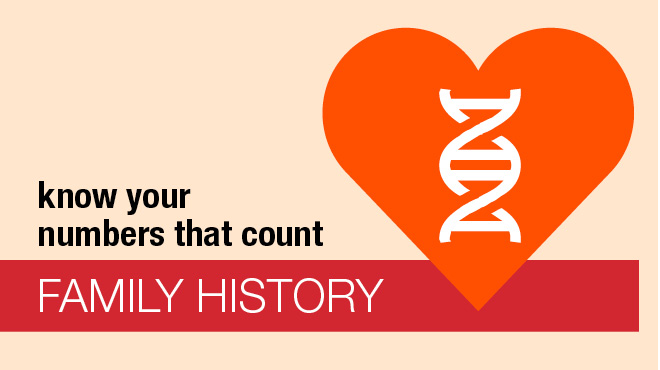Recent Posts
Genetic testing gives insight into cardiac conditions

Many health conditions have a genetic link. A gene is like an instruction manual for your body that tells your body how to function, develop and stay healthy.
Some cardiac conditions have a genetic component to them. These genetic components, called inherited genetic mutations, can predispose a person to develop a cardiac condition. Cardiomyopathy, high cholesterol, coronary artery disease, aortic aneurysm and dissection, and arrhythmia all can have genetic risk factors associated with the condition.
If a genetic component may be associated with a cardiac condition, your health care team may refer you to a genetic counselor.
Meeting with a genetic counselor
When a referral from a health care professional, or a self-referral, is made to see a genetic counselor, the counseling appointment can be in person or virtual. The genetic counselor will discuss personal health history, medications, and a three-generation family health history, called a pedigree.
Cardiac-related conditions gathered for the pedigree can include family history for:
- Aortic aneurysm or dissection
- Arrhythmias
- Cardiomyopathy
- Coronary bypass surgery
- Echocardiogram or electrocardiogram testing
- Heart attacks
- High cholesterol
- Stent placement procedures
- Sudden cardiac arrest
The person's age when these cardiac-related conditions occurred or developed is important.
Building and understanding a family pedigree explains how conditions are passed on through families and helps identify patterns of inheritance.
Genetic testing for hypertrophic cardiomyopathy
With hypertrophic cardiomyopathy, the heart muscle thickens, reducing the heart's ability to pump blood effectively. In severe cases, it can lead to heart failure or cardiac arrest.
A significant portion of people with hypertrophic cardiomyopathy have a hereditary form of the condition. If you have a first-degree relative with the disease, which includes a parent or sibling, it is recommended that you undergo regular cardiac diagnostic evaluation. First-degree relatives have a 50% risk of having this mutation.
If your testing identifies a genetic mutation for hypertrophic cardiomyopathy, other relatives also may choose to undergo testing to determine if they carry the genetic risk, known as cascade testing.
Cascade testing involves informing family members of a genetic condition found within a blood relative. After identifying a specific genetic mutation, first-degree family members can be tested to determine if they also inherited the mutation.
If cascade testing shows a family member carries the genetic mutation, they are at increased risk of developing the associated condition and can be appropriately monitored.
When cascade testing does not show the same genetic mutation, the family member is not at increased risk of developing the condition and can consult with their health care team to determine if monitoring is necessary.
Dilated cardiomyopathy
Dilated cardiomyopathy is another cardiac condition that can run in families. With dilated cardiomyopathy, the heart wall thins, the chamber enlarges, and the heart cannot pump blood as efficiently to the rest of the body. A family history of dilated cardiomyopathy, heart failure or sudden cardiac arrest increases the suspicion of a genetic risk for the condition.
Cascade testing is recommended for first-degree relatives to determine if they carry the genetic mutation for dilated cardiomyopathy after it is identified in a family member. As with hypertrophic cardiomyopathy, first-degree relatives have a 50% risk of having this mutation.
Familial hypercholesterolemia
About 1 in every 250 people has familial hypercholesterolemia, and up to 90% of people are undiagnosed. The genetic changes that cause familial hypercholesterolemia are inherited. Although symptoms may not appear until adulthood, genetic risk is present from birth and the condition can be diagnosed in children.
Familial hypercholesterolemia affects how the body processes cholesterol. People with familial hypercholesterolemia have a higher risk of heart disease and early heart attack.
Adults and children with familial hypercholesterolemia have very high levels of low-density lipoprotein (LDL) cholesterol in their blood, typically 190 milligrams per deciliter or higher for adults and 130 to 160 milligrams per deciliter for children. LDL cholesterol is known as "bad" cholesterol because it can build up in the walls of the arteries, making them hard and narrow.
Most people with this condition receive one affected gene from one parent. But in rare cases, a child can get the affected gene from both parents. This can cause a more severe form of the condition.
If a parent with familial hypercholesterolemia is identified, their children can be evaluated through genetic testing.
Next steps after genetic testing
Genetic testing results are shared with the patient, referring health care professional and primary care provider. If testing identifies a genetic mutation, the patient is given a letter to provide to family members informing them that someone in their family has a gene mutation and explaining why genetic counseling and testing should be considered. Those relatives can then refer themselves for genetic counseling.
Identifying genetic variants that may indicate your risk of inheriting or developing certain illnesses or diseases allows you to make informed health decisions, such as:
- Lifestyle or environmental changes
Some health conditions are almost completely determined by your genes, while others are more influenced by your environment. While you can't change your genes, you can control some aspects of your environment, such as diet, physical activity and tobacco use. - Preventive treatment
Knowing your risk of developing a condition allows you to seek preventive care tailored to you, such as starting screenings earlier than the recommended age or more frequently.
Rachel Keppers specializes in genetic counseling for inherited diseases.




